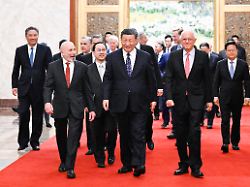Charm offensive from Beijing
Xi rolls out the red carpet for US company bosses
March 27, 2024, 3:33 p.m
China and the USA are at cross-purposes on trade policy. Last year, foreign direct investment in China fell significantly. The leadership in Beijing is doing a lot to get new money. Xi Jinping launches a charm offensive.
China is pushing a charm offensive to attract foreign direct investment at the highest levels. President Xi Jinping met with U.S. business leaders at the Great Hall of the People in Beijing. Among the 20 or so all male company captains were Stephen Schwarzman, co-founder and CEO of the private equity firm Blackstone, Fedex boss Raj Subramaniam and Cristiano Amon, who leads the chip manufacturer Qualcomm. “The history of China-US relations is a history of friendly exchanges between our two peoples,” Xi said, according to state media. He called on the two countries to “seek common ground and create greater consensus.”
According to an insider, the meeting lasted around 90 minutes. This Wednesday’s meeting followed a November meeting with U.S. leaders in San Francisco, where Xi received standing applause. But China and the USA are at odds when it comes to trade policy. In addition, the Taiwan question and the People’s Republic’s disputed territorial claims in the South China Sea are causing controversy.
Direct investment is shrinking
“China’s development has gone through all kinds of difficulties and challenges to get to where it is today,” Xi said, according to state media. Despite prophecies of doom to the contrary, development has not yet reached its peak. Leaders in Beijing want to boost growth in the world’s second-largest economy this year after foreign direct investment in China fell 8 percent in 2023.
In view of falling investments, the People’s Republic is now offering foreign companies the prospect of an end to the disadvantage. In the future, they should be treated in the same way as domestic companies, Vice Minister of Trade Guo Tingting recently said, but did not give any details. Important areas of industry and the financial sector should also be opened up, more market opportunities created and a multilateral trading system with the WTO at its core resolutely defended.
Western companies have been complaining about unequal market access in China for years. At the same time, Western governments are encouraging companies to relocate supply chains and operations outside of China as part of a so-called de-risking strategy in order to become less economically dependent on the People’s Republic. Beijing has scared away many investors with the introduction of a comprehensive anti-espionage law, rigid corona restrictions and raids on consulting firms.
